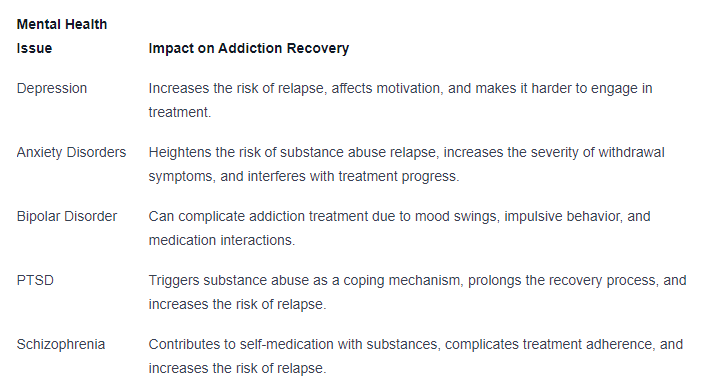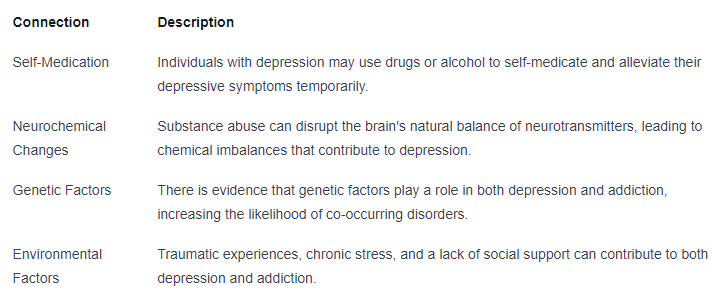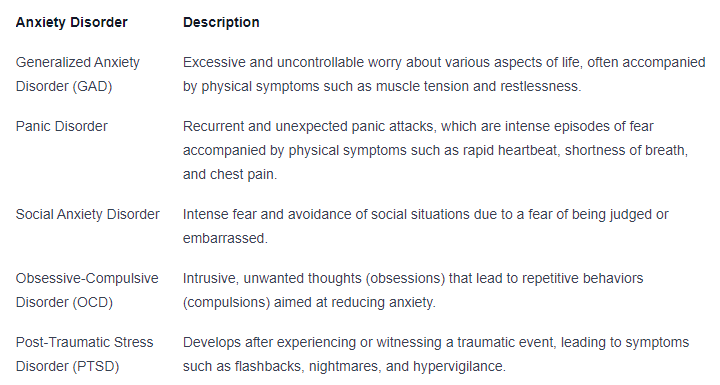Most Common Mental Health Issues Associated with Addiction

Understanding Addiction and Mental Health
When it comes to addiction, it's important to recognize the strong connection between addiction and mental health. The two often go hand in hand, with mental health issues frequently co-occurring alongside addiction. Understanding this connection and the impact of mental health on addiction recovery is crucial in providing comprehensive and effective treatment.
The Connection Between Addiction and Mental Health
Addiction and mental health issues often intersect, influencing and exacerbating one another. Many individuals struggling with mental health disorders turn to substances as a way to cope with their symptoms, seeking temporary relief or self-medication. However, this self-medication can quickly lead to addiction, creating a complex cycle that is challenging to break.
Conversely, substance abuse itself can contribute to the development or worsening of mental health disorders. Prolonged substance use can disrupt brain chemistry and affect mood regulation, leading to the onset or intensification of mental health symptoms.
It's important to remember that the relationship between addiction and mental health is multifaceted and can vary from person to person. Some common mental health issues associated with addiction include depression, anxiety disorders, bipolar disorder, post-traumatic stress disorder (PTSD), and schizophrenia.
Impact of Mental Health on Addiction Recovery
Mental health plays a significant role in the recovery journey of individuals struggling with addiction. Addressing and treating underlying mental health issues is crucial for achieving long-term recovery and preventing relapse.

To support individuals in their addiction recovery, it is crucial to address both the addiction itself and the underlying mental health issues. Integrated treatment approaches that simultaneously target addiction and mental health disorders have shown promising results. These approaches involve a combination of therapy, medication management, support groups, and lifestyle changes tailored to the individual's specific needs.
By understanding the connection between addiction and mental health and recognizing the impact of mental health on addiction recovery, healthcare professionals can provide more effective and holistic treatment that addresses the root causes of addiction. Supporting individuals in their journey to recovery requires a comprehensive approach that takes into account both their addiction and their mental health needs.
Depression and Addiction
Depression and addiction often go hand in hand, creating a complex and challenging situation for individuals. Understanding the link between depression and addiction is crucial for effective treatment and recovery.
Link Between Depression and Addiction
Depression and addiction are closely intertwined. Many individuals with depression turn to substances as a way to cope with their emotional pain or to temporarily alleviate their symptoms. However, substance abuse can exacerbate depression symptoms and create a vicious cycle of dependency.
The relationship between depression and addiction can be summarized as follows:

Dual Diagnosis: Treating Depression and Addiction Together
When someone experiences both depression and addiction, it is referred to as a dual diagnosis or co-occurring disorders. It's essential to address both conditions simultaneously to achieve successful treatment outcomes.
Integrated treatment approaches that target both depression and addiction are often the most effective. These approaches may include:
By addressing both depression and addiction simultaneously, individuals have a higher chance of achieving lasting recovery and improved mental well-being. It's important to seek professional help and work with a qualified healthcare provider to develop a personalized treatment plan that addresses the unique needs of each individual.
Anxiety Disorders and Addiction
Anxiety disorders are among the most common mental health issues associated with addiction. Individuals with anxiety disorders often turn to substances as a way to cope with their symptoms, leading to a higher risk of developing an addiction. In this section, we will explore the common anxiety disorders associated with addiction and discuss the importance of addressing anxiety disorders in addiction treatment.
Common Anxiety Disorders Associated with Addiction
Anxiety disorders encompass a range of conditions characterized by excessive worry, fear, and apprehension. Here are some of the most common anxiety disorders associated with addiction:

Individuals with these anxiety disorders may turn to drugs or alcohol as a means of self-medication, hoping to alleviate their anxiety symptoms temporarily. However, this self-medication can quickly spiral into addiction, creating a vicious cycle that worsens both the anxiety disorder and the addiction.
Addressing Anxiety Disorders in Addiction Treatment
Addressing anxiety disorders is crucial in addiction treatment. It's essential to recognize that treating addiction alone may not be sufficient if the underlying anxiety disorder is not addressed simultaneously. Integrated treatment approaches that target both the addiction and the anxiety disorder provide the best chance for long-term recovery.
The treatment of co-occurring anxiety disorders and addiction typically involves a combination of therapies, including:
By addressing the underlying anxiety disorders in addiction treatment, individuals have a better chance of achieving lasting recovery. It's important for healthcare professionals to conduct a comprehensive assessment to identify co-occurring anxiety disorders and tailor treatment plans that address both the addiction and the mental health issue simultaneously.
Bipolar Disorder and Addiction
Bipolar disorder is a mental health condition characterized by extreme shifts in mood, energy, and activity levels. Individuals with bipolar disorder are more prone to developing addiction than those without this condition. Understanding the relationship between bipolar disorder and addiction is essential for effective treatment and recovery.
The Relationship Between Bipolar Disorder and Addiction
Bipolar disorder and addiction often coexist, and the relationship between the two is complex. Several factors contribute to the connection between bipolar disorder and addiction:
It is important to note that addiction can worsen the symptoms of bipolar disorder and make treatment more challenging. Therefore, addressing both conditions simultaneously is crucial for successful recovery.
Integrated Treatment for Bipolar Disorder and Addiction
Integrated treatment approaches that target both bipolar disorder and addiction have shown promising results. Effective treatment strategies include:
Integrated treatment plans are tailored to each individual's unique needs, combining interventions for bipolar disorder and addiction. The goal is to achieve stability in mood, manage symptoms, develop healthy coping mechanisms, and maintain lifelong recovery.
By addressing both bipolar disorder and addiction concurrently, individuals can experience improved quality of life, better mental health outcomes, and a reduced risk of relapse. Seeking professional help from mental health and addiction specialists is essential in providing comprehensive and effective treatment for individuals with these co-occurring conditions.
Post-Traumatic Stress Disorder (PTSD) and Addiction
Post-Traumatic Stress Disorder (PTSD) and addiction often coexist, creating a complex and challenging situation for individuals. Understanding the connection between PTSD and addiction is crucial for effective treatment and recovery.
How PTSD and Addiction Are Connected
PTSD is a mental health condition that can develop after experiencing or witnessing a traumatic event. Individuals with PTSD may struggle with intrusive memories, flashbacks, nightmares, and intense emotional distress related to the traumatic event. To cope with these distressing symptoms, some individuals turn to substance abuse as a way to self-medicate and numb their emotional pain.
The connection between PTSD and addiction is multifaceted. Here are a few key points:
Treating PTSD and Addiction Simultaneously
Addressing both PTSD and addiction simultaneously is crucial for successful recovery. Integrated treatment approaches that specialize in dual diagnosis are particularly effective in managing these co-occurring conditions. Here are some key considerations in treating PTSD and addiction:
Treating PTSD and addiction simultaneously requires a comprehensive and individualized approach. By addressing both conditions in an integrated manner, individuals have a better chance of achieving lasting recovery and improving their overall well-being.
Schizophrenia and Addiction
Schizophrenia is a complex mental health disorder that can have a profound impact on a person's life. Unfortunately, individuals with schizophrenia are more vulnerable to developing addiction issues compared to the general population. Understanding the link between schizophrenia and addiction is crucial in order to provide comprehensive treatment and support.
Understanding the Link Between Schizophrenia and Addiction
The relationship between schizophrenia and addiction is multifaceted. Several factors contribute to the increased risk of addiction among individuals with schizophrenia. These include:
Comprehensive Treatment for Schizophrenia and Addiction
Treating individuals with co-occurring schizophrenia and addiction requires a comprehensive and integrated approach. It is essential to address both conditions concurrently to achieve optimal outcomes. The treatment approach may involve the following components:
It is important to note that treatment plans should be individualized and based on a thorough assessment of each person's unique needs. Collaborative care involving mental health professionals, addiction specialists, and other healthcare providers is crucial for effective management of schizophrenia and addiction.
By recognizing the link between schizophrenia and addiction and implementing comprehensive treatment approaches, individuals can receive the support they need to navigate both conditions and improve their overall well-being.
Conclusion
In conclusion, addiction and mental health are deeply interconnected, with mental health issues often co-occurring alongside addiction. Depression, anxiety disorders, bipolar disorder, PTSD, and schizophrenia are among the most common mental health issues associated with addiction.
To support individuals in their journey to recovery, it is crucial to address both the addiction itself and the underlying mental health issues. Integrated treatment approaches that simultaneously target addiction and mental health disorders have shown promising results.
By recognizing the link between mental health and addiction and implementing comprehensive treatment approaches that address both conditions concurrently, individuals can receive the support they need to navigate both conditions and improve their overall well-being. It's essential for healthcare professionals to conduct a thorough assessment of each individual's unique needs and tailor treatment plans accordingly. With the right care and support, individuals can achieve lasting recovery from addiction while improving their mental health outcomes.
Sources:
- National Institute on Drug Abuse (https://www.drugabuse.gov/)
- Substance Abuse and Mental Health Services Administration (https://www.samhsa.gov/)
- American Psychiatric Association (https://www.psychiatry.org/)
- National Alliance on Mental Illness (https://www.nami.org/)
- Dual Diagnosis.org (https://dualdiagnosis.org/)
